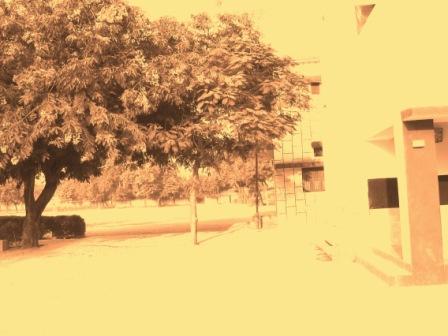"I have been one of the fortunate ones of the Earth,
Having gazed upon Beauty and Truth all my days,
And I had no need to think or to write concerning them,
But when Beauty and Truth were withdrawn from me,
I found I could no longer live without them,
But I was obliged to keep them ever by my side,
I therefore wrote of them,
and to write I thought of them,
And by thinking kept them with me and they stayed."
[by Stanley de Vere Alexander Julius, "The Poem of a Prisoner of War, 1917"]
If all we have is human experience, what can we do with it? We hold on to and communicate these experiences...through language. Humans are drawn to strings of words...that are ultimately the vehicles for communicating our experiences.
Interestingly, the recreation and communication of experience often reaches its zenith when immediate outlets are few. Is it any surprise that some of the most moving poetic expressions were created in incarceration. Faiz comes to mind:
"Dayaar-e-ghair mein mehram agar nahin koi,
To Faiz zikr-e-watan apne ru-ba-ru hi sahi."
Incarcerations though could also be of the mind, and not necessarily behind physical iron cages. Firaq's lifelong search for beauty outside his immediate life and the recurring portrayal of "night" and "darkness" as themes in his verses come to mind:
"Ghazal ka saaz uthao badi udaas hai raat,
Nawaa-e-Meer sunao badi udaas hai raat."
[Listen to it sung beautifully by Jagjit here]
I'll explore the entire ghazals related to these Urdu verses soon...
Subscribe to:
Post Comments (Atom)






7 comments:
When talking of poetry within captivity, Faiz probably has come up with the most wonderful potrayals
In his nazm Intesaab for instance
"un aseero.n ke naam
Jin ke seeno.n mein fardaa ke shabtaab gauhar
Jail_khaano.n ki shoreedaa raato.n ki sar-sar mein
jal-jal ke anjum-numaa.n ho gaye hai.n "
or then
"mataa-e-lauh-e-qalam chhin gayi to kya gham hai,
ke khoon-e-dil mein dubo li hai ungliyaa.n maine
zubaan pe mohur lagi hai to kya
ke rakh di hai
har ek halqa-e-zanjeer me zubaan maine"
Aah its a pleasure to re recite Faiz too:)
Oh yes! Faiz in captivity is unmatched...agree wholeheartedly. Will try my hand at interepreting and translating some soon...
Thx for sharing the verses!
Talking of exile and Faiz, here is an interesting excerpt from a book on Edward Said that I was reading, where he talks about meeting Faiz.
To see a poet in exile —- as opposed to reading the poetry of exile —- is to see exile’s antinomies embodied and endured. Several years ago, I spent some time with Faiz Ahmad Faiz, the greatest of contemporary Urdu poets. He had been exiled from his native Pakistan by Ziaul Haq’s military regime and had found a welcome of sorts in the ruins of Beirut. His closest friends were Palestinians, but I sensed that although there was an affinity of spirit between them, nothing quite matched —- language, poetic convention, life history. Only once, when Eqbal Ahmad, a Pakistani friend and fellow exile, came to Beirut, did Faiz seem to overcome the estrangement written all over his face.
Even though I have not been able to explore Faiz's work due the language handicap, I feel its not just Faiz; exile and incarceration in general make that creative flame burn a lot brighter. But it takes its toll; perhaps the emotional upheaval that comes with it is a double edged sword.
Not to forget that Edward Said himself lived all his life in exile.
Has Faiz written something on the effect of these periods of exile and incarceration on him ?
Arfi:
Thx for the extract! It was a pleasure to read someone like Edward Said commenting on Faiz.
As for the language handicap: Hope blogs like this one will help u overcome ;-)
I dont know if Faiz has written of the effect of exile on himself, but the theme surely runs thru a lot of his work as Illusionist said...perhaps the Illusionist can illuminate us more...
this one from Bahadur Shah Zafar came to my mind:
"hai kitna badnaseeb Zafar dafn ke liye
do gaz zamiin bhi na mili ku-e-yaar mein"
Introvert:
Oh yes. That one's right on target...the exile and captivity of the emperor-poet! Thx for sharing...love that entire ghazal actually.
Arfi and Siyaah: I haven't come across anything that Faiz may have written about his exile, but that is most probably on account of my limited reading. I had once seen a play on the life of Faiz which spoke of letters that he wrote to his wife during the exile. Im sure they must be published and something would be mentioned in them. Sorry for replying so late. I tend to comment and forget:(
Post a Comment